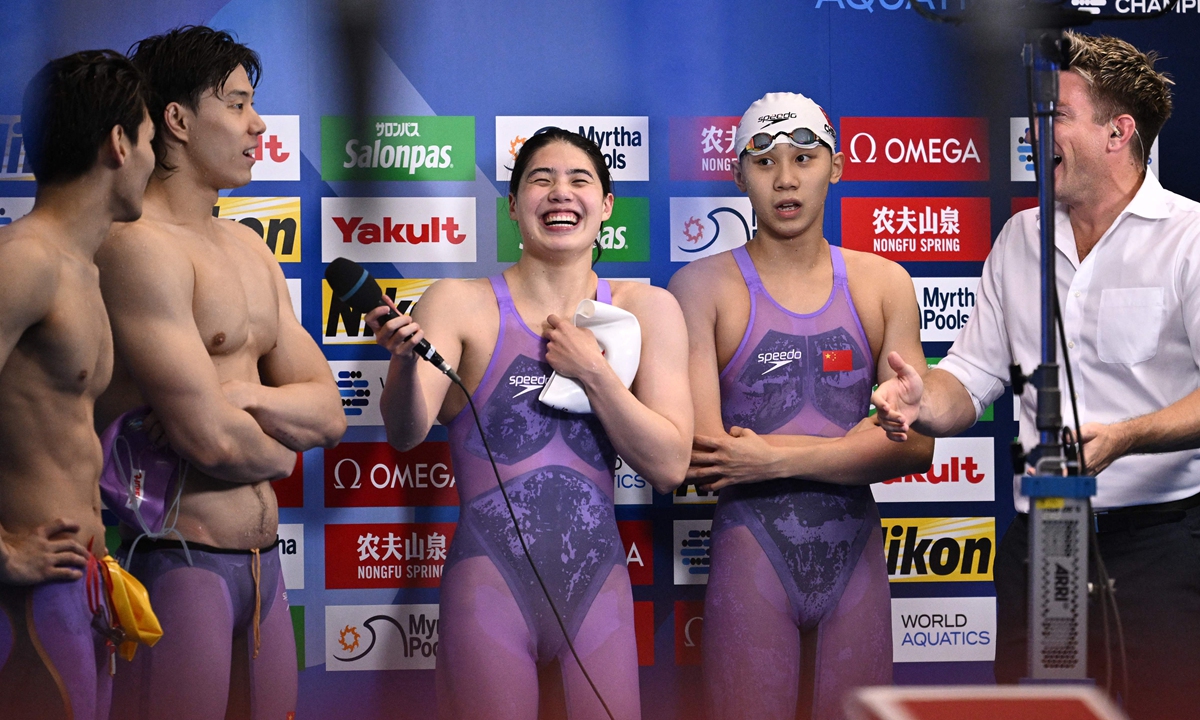
(From left) Chinese swimmers Xu Jiayu, Qin Haiyang, Zhang Yufei and Cheng Yujie have fun in an interview after their victory in the final of the mixed 4x100 meters medley relay during the World Aquatics Championships in Fukuoka, Japan on July 26, 2023. Team China put together a winning time of 3 minutes and 38.57 seconds. Photo: VCG
Chinese swimmers have undergone far more tests than their US counterparts in the buildup to the Paris Olympics, figures from the world swimming governing body's Aquatics Integrity Unit show.
The numbers from the unit, an operationally independent unit of World Aquatics, show prominent Chinese swimmers Zhang Yufei, a two-time Olympic champion in women's butterfly swimming; Qin Haiyang, a world record holder in men's 200 meters breaststroke; and female freestyle distance swimmer Li Bingjie took over 40 anti-doping tests in 2023.
The figures for their US counterparts, such as 11-time world champion Lilly King, seven-time Olympic champion Caeleb Dressel and Katie Ledecky, who with seven Olympic gold and 21 world titles is the world's most decorated female swimmer, stay at around 10.
The doping tests taken by Chinese swimmers have been put under scrutiny since April, when the US began sensationalizing the time the athletes tested positive for the banned substance trimetazidine (TMZ) at a 2021 Chinese domestic competition.
"Accepting the rigorous testing regime, even though it looks unfair due to the vast amount for Chinese athletes, is a testament to China's dedication to maintaining the integrity of the sport," Mao Jiale, a Chengdu-based sports commentator, told the Global Times on Tuesday.
"The World Aquatics' audit and the frequency of anti-doping tests for Chinese athletes demonstrate the commitment to clean competition, a stark refute to US accusations."
The Chinese Anti-Doping Agency (CHINADA) reported positive tests for 23 swimmers in January 2021. These positive results were later investigated and determined to be caused by contaminated food consumed during the domestic competition.
CHINADA concluded that the positive tests were not due to fault or negligence on the part of the athletes, and the cases were not pursued as anti-doping rule violations. Both the World Anti-Doing Agency and World Aquatics accepted CHINADA's statement.
To respond to the US' efforts to sensationalize the case, in May 2024 World Aquatics established an anti-doping audit review committee to scrutinize not only the TMZ case but also all doping cases under its jurisdiction.
The audit report, which was released on Monday, notes that some athletes will be tested four times by the International Testing Agency (ITA) from January 1, 2024 to the opening of the Paris Olympics. However, testing of Chinese athletes will be twice that of other countries.
"A certain number of other athletes, including Chinese athletes taking part in the Paris Olympic Games, will be tested by the ITA no less than eight times during the same period," the report said.
"The ITA will use its best efforts to have all such tests of Chinese athletes conducted by a Sample Collection Authority other than CHINADA, and to have the samples analyzed by laboratories outside of China."
As the Paris Olympics approach, the Chinese swimming team, comprising 31 athletes, is undergoing intensive pre-competition training in Deauville, France, before moving to Paris.
"The heightened focus on anti-doping measures and compliance ensures that Chinese athletes are well-prepared and committed to showcasing their talent on the global stage with integrity," Mao noted.
The swimming events of the Paris Olympic Games are set to begin on July 27, a day after the opening ceremony.




